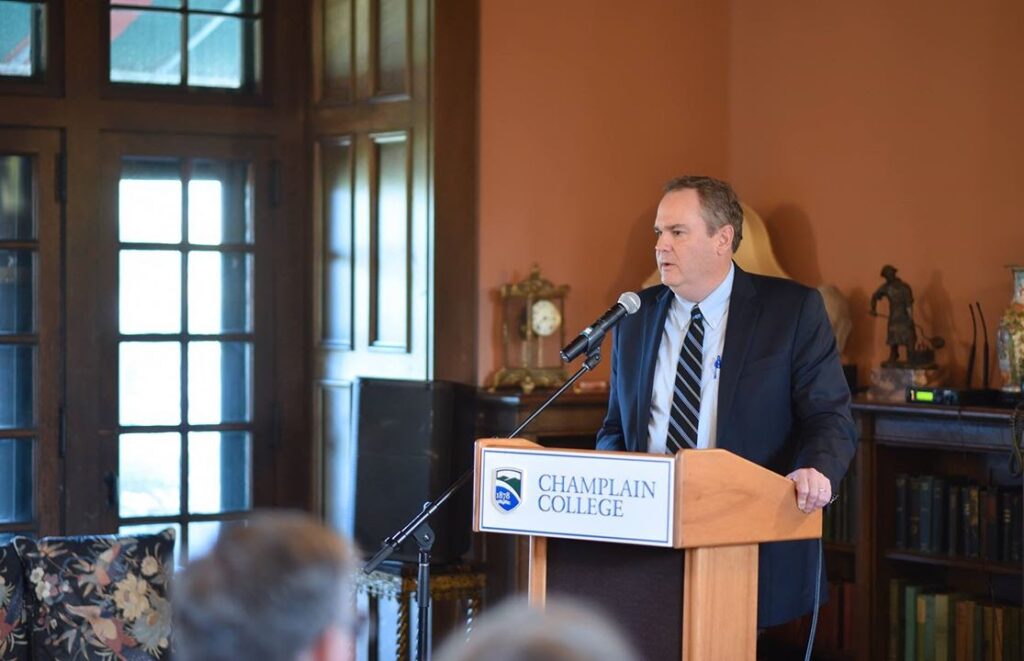More than 80,000 Vermont students could benefit from a free program that gives teachers access to the tools, resources, and training they need to successfully integrate personal finance education into their classrooms and organizations.
Contact: John Pelletier at jpelletier@champlain.edu
The Center for Financial Literacy at Champlain College, in partnership with the Vermont Agency of Education, is offering free online (and on-demand) financial literacy training for Vermont educators. Through the program, which begins on March 3, educators will learn how to successfully teach personal finance in their classrooms and organizations. Courses will be accessible asynchronously through the end of May, and educators will be given 90 days to complete up to seven hours in professional development training. Credit will be given to teachers for total or partial completion of the available sessions.
“It is an understatement to say COVID-19 has shifted our education system,” says Courtney Poquette, a teacher at Winooski High School. “Teachers are shifting their instructional approach, students are rethinking decisions about the debt they want to take on, and families are struggling financially. Now is the time for financial literacy education, more than ever. I am excited that this on-demand professional development will be accessible to all K-12 educators in the state; and the lessons learned in eight short hours will have a lasting impact not only on the students in our classrooms today, but their families and future generations.”
Training now available to a wider audience of educators thanks to virtual education.
The training, originally conceived for Vermont K-12 educators, and funded primarily by a $200,000 grant in 2018 from Northfield Savings Bank Foundation, has been opened up to more Vermont educators this year thanks to the virtual nature of the program. Parents homeschooling their children, employees and volunteers at nonprofit organizations, professionals in after-school programs, and educators in state or local agencies—including adult GED educators, prison educators, social workers, VSAC tutors, and community action groups and restorative justice programs—are all encouraged to participate.
“This is an excellent opportunity for Vermont educators to improve student outcomes in this key academic and life skill,” said Secretary of Education Daniel M. French. “Nothing better captures the intersection of personalized, proficiency-based learning like financial literacy. Financial literacy is a vital skill for young people to develop, bringing real-world learning into the classroom and applying classroom learning to the real world. Confident, trained teachers will help build a strong, 21st-century, cradle-to-career education system.”


Teachers can gain professional development credit (and an Amazon gift card).
John Pelletier, Director of the Center for Financial Literacy, says the conference is primarily designed to improve the financial literacy of 80,000 K-12 public education students by giving all of Vermont’s 8,000 educators access to the tools, resources and training they need to successfully integrate new personal finance education standards into their classrooms.
Pelletier says Vermont educators can earn up to seven hours of professional development training and receive suggestions for grade-appropriate personal finance classroom resources over the 90-day period of the conference. Plus, the first 400 educators to complete all training sessions will be given a $50 Amazon gift card.


A comprehensive personal finance curriculum based on national standards.
During the conference, which features nationally known experts, participants will learn how to implement the JumpStart National Standards in K-12 Financial Personal Finance Education. These standards allow for the teaching of personal finance in an interdisciplinary or standalone manner.
There will be separate tracks for elementary, middle and high school teachers. All live sessions will be recorded and available later for on-demand viewing.
Pelletier says Vermont and other states have embraced the JumpStart standards because they are rigorous and comprehensive. Experts agree that these free, interdisciplinary personal finance standards are effective.


“Participants will also see that these standards are very flexible, so that any teacher at any grade level can find appropriate and relevant content that aligns with other course standards,” says Pelletier.
Along with the grant from Northfield Savings Bank Foundation, the Center also received $45,000 from the National Life Group Foundation and $16,000 from Next Gen Personal Finance (NGPF).
“Next Gen Personal Finance is thrilled to support such an important initiative,” says Tim Ranzetta, NGPF’s Co-Founder. “Financial capability is more critical and relevant than ever; that’s why we are so excited to see that the Center for Financial Literacy at Champlain College and the Vermont Agency of Education are expanding their professional development offerings to educators, parents, and professionals all across the state. This will have a tremendous impact on students in classrooms.”
In partnership with the Agency of Education, Champlain College’s Center for Financial Literacy and 16 state educators (as part of a professional learning community) worked for nearly two years to create the Vermont-specific materials for the conference and enlisted the event speakers.
Educators can register for the program at this link.
About Northfield Savings Bank Foundation
The Northfield Savings Bank Foundation was established in 2000 through Northfield Savings Bank as part of the bank’s longstanding commitment to donate 10 percent of its yearly earnings to the local community. The Foundation supports Vermont-based efforts focused around improving residents’ well-being and self-sufficiency in areas such as financial literacy, education and at-risk youth. When considering an area of need or partnership, the Foundation is deliberate, focused and thorough in its assessment to ensure significant results can be achieved given the amount of time and money to be invested. On average, Northfield Savings Bank contributes more than $600,000 annually through its Foundation and its Community Giving program as part of its pledge to give back to the areas it serves. Founded in Northfield, Vt. in 1867, Northfield Savings Bank is the largest independent bank in Vermont, offers a full-range of community banking, commercial banking, mortgage banking and investment services to more than 35,000 consumer and commercial customers and operates 13 branches throughout central Vermont and Chittenden County stretching from Bethel to Greater Burlington. Member FDIC. Equal Housing Lender. www.nsbvt.com
About Next Gen Personal Finance
Next Gen Personal Finance (NGPF), has become the one-stop shop for more than 42,000 educators looking for high-quality, engaging personal finance curriculum to equip students with the skills to thrive in the future. NGPF curriculum has a broad reach, with more than 7 out of 10 U.S. high school students attending schools where a teacher utilizes NGPF resources. NGPF supports educators with the most comprehensive suite of professional development services: 7,000+ teachers participated in more than 120,000 hours of NGPF professional development in 2020 alone. The nonprofit has been recognized by Common Sense Education as a “Top Website for Teachers to Find Lesson Plans” and “Best Business and Finance Games.” For access to NGPF free resources, visit www.ngpf.org.
About The Center for Financial Literacy
Established in 2010, Champlain College’s Center for Financial Literacy is committed to improving the personal finance knowledge of our nation’s K–12 and college students, teachers, and adults. The Center supports this mission with advocacy, published research reports that are used by state and local policymakers, K-12 educator training programs, and providing training and tools for educators and college students. With its groundbreaking InSight program, Champlain College is one of the few colleges that has made quality personal finance education an essential and mandatory part of their curriculum. The Center is nationally recognized for its work: by the White House in a 2012 report Every American Financially Empowered for its unique graduate-level training program for high school educators (subject to a National Endowment for Financial Education study and Center study) and its college undergraduate training programs; by the Consumer Financial Protection Bureau in reports for state and local policymakers (see 2015 Report and 2017 Report); and by the press for its Adult and High School Report Cards on Financial Literacy. The Center’s founding Director, John Pelletier, was formerly chief operating officer and chief legal officer at some of the largest asset management firms in the United States. John was appointed by the governor to co-chair the Vermont Financial Literacy Commission alongside the Vermont State Treasurer. For more information visit the Center’s website: www.champlain.edu/cfl.
About Champlain College
Founded in 1878, Champlain College is one of the most innovative regionally accredited not-for-profit colleges in the United States. Located in Burlington, Vermont—with additional campuses in Montreal, Canada, and Dublin, Ireland—Champlain offers a traditional undergraduate experience from its beautiful campus overlooking Lake Champlain. In addition, Champlain College Online serves more than 3,000 students through undergraduate and graduate degree programs and certificates in high-growth fields like cybersecurity, healthcare administration, and human resource management. It is one of the oldest online institutions in the United States and consistently ranks as a leader in online higher education by U.S. News & World Report. The College’s distinctive career-driven approach to higher education embodies the notion that true learning occurs when information and experience come together to create knowledge. For the sixth year in a row, Champlain was named a “Most Innovative School” in the North by U.S. News & World Report’s “America’s Best Colleges” rankings, and was listed among The Princeton Review’s “The Best 386 Colleges” in 2021. Champlain is also featured in the 2020 Fiske Guide to Colleges as one of the “best and most interesting schools” in the United States, Canada, and Great Britain and was recognized as a 2020 College of Distinction for its “Engagement, Teaching, Community, and Outcomes.” For more information, visitwww.champlain.edu.